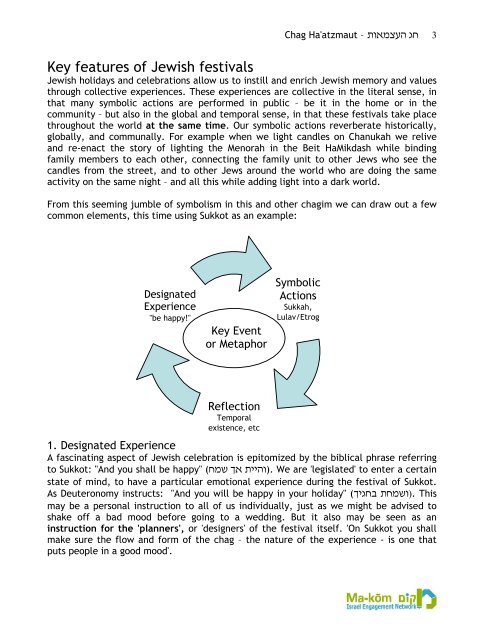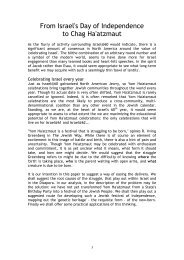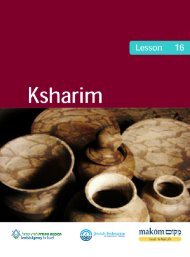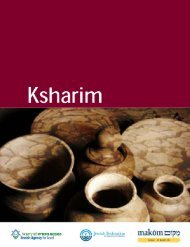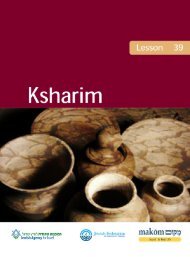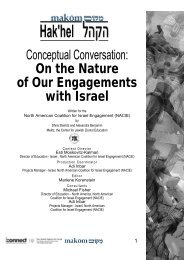Lihiyot Am Chofshi b'Artzenu To be a Free People in ... - Makom Israel
Lihiyot Am Chofshi b'Artzenu To be a Free People in ... - Makom Israel
Lihiyot Am Chofshi b'Artzenu To be a Free People in ... - Makom Israel
You also want an ePaper? Increase the reach of your titles
YUMPU automatically turns print PDFs into web optimized ePapers that Google loves.
3 חג העצמאות – Ha'atzmaut Chag<br />
Key features of Jewish festivals<br />
Jewish holidays and celebrations allow us to <strong>in</strong>still and enrich Jewish memory and values<br />
through collective experiences. These experiences are collective <strong>in</strong> the literal sense, <strong>in</strong><br />
that many symbolic actions are performed <strong>in</strong> public – <strong>be</strong> it <strong>in</strong> the home or <strong>in</strong> the<br />
community – but also <strong>in</strong> the global and temporal sense, <strong>in</strong> that these festivals take place<br />
throughout the world at the same time. Our symbolic actions rever<strong>be</strong>rate historically,<br />
globally, and communally. For example when we light candles on Chanukah we relive<br />
and re-enact the story of light<strong>in</strong>g the Menorah <strong>in</strong> the Beit HaMikdash while b<strong>in</strong>d<strong>in</strong>g<br />
family mem<strong>be</strong>rs to each other, connect<strong>in</strong>g the family unit to other Jews who see the<br />
candles from the street, and to other Jews around the world who are do<strong>in</strong>g the same<br />
activity on the same night – and all this while add<strong>in</strong>g light <strong>in</strong>to a dark world.<br />
From this seem<strong>in</strong>g jumble of symbolism <strong>in</strong> this and other chagim we can draw out a few<br />
common elements, this time us<strong>in</strong>g Sukkot as an example:<br />
Designated<br />
Experience<br />
"<strong>be</strong> happy!"<br />
Key Event<br />
or Metaphor<br />
Symbolic<br />
Actions<br />
Sukkah,<br />
Lulav/Etrog<br />
Reflection<br />
Temporal<br />
existence, etc<br />
1. Designated Experience<br />
A fasc<strong>in</strong>at<strong>in</strong>g aspect of Jewish celebration is epitomized by the biblical phrase referr<strong>in</strong>g<br />
to Sukkot: "And you shall <strong>be</strong> happy" אך שמח) .(והיית We are 'legislated' to enter a certa<strong>in</strong><br />
state of m<strong>in</strong>d, to have a particular emotional experience dur<strong>in</strong>g the festival of Sukkot.<br />
As Deuteronomy <strong>in</strong>structs: "And you will <strong>be</strong> happy <strong>in</strong> your holiday" ( ושמחת בחגיך ). This<br />
may <strong>be</strong> a personal <strong>in</strong>struction to all of us <strong>in</strong>dividually, just as we might <strong>be</strong> advised to<br />
shake off a bad mood <strong>be</strong>fore go<strong>in</strong>g to a wedd<strong>in</strong>g. But it also may <strong>be</strong> seen as an<br />
<strong>in</strong>struction for the 'planners', or 'designers' of the festival itself. 'On Sukkot you shall<br />
make sure the flow and form of the chag – the nature of the experience - is one that<br />
puts people <strong>in</strong> a good mood'.


